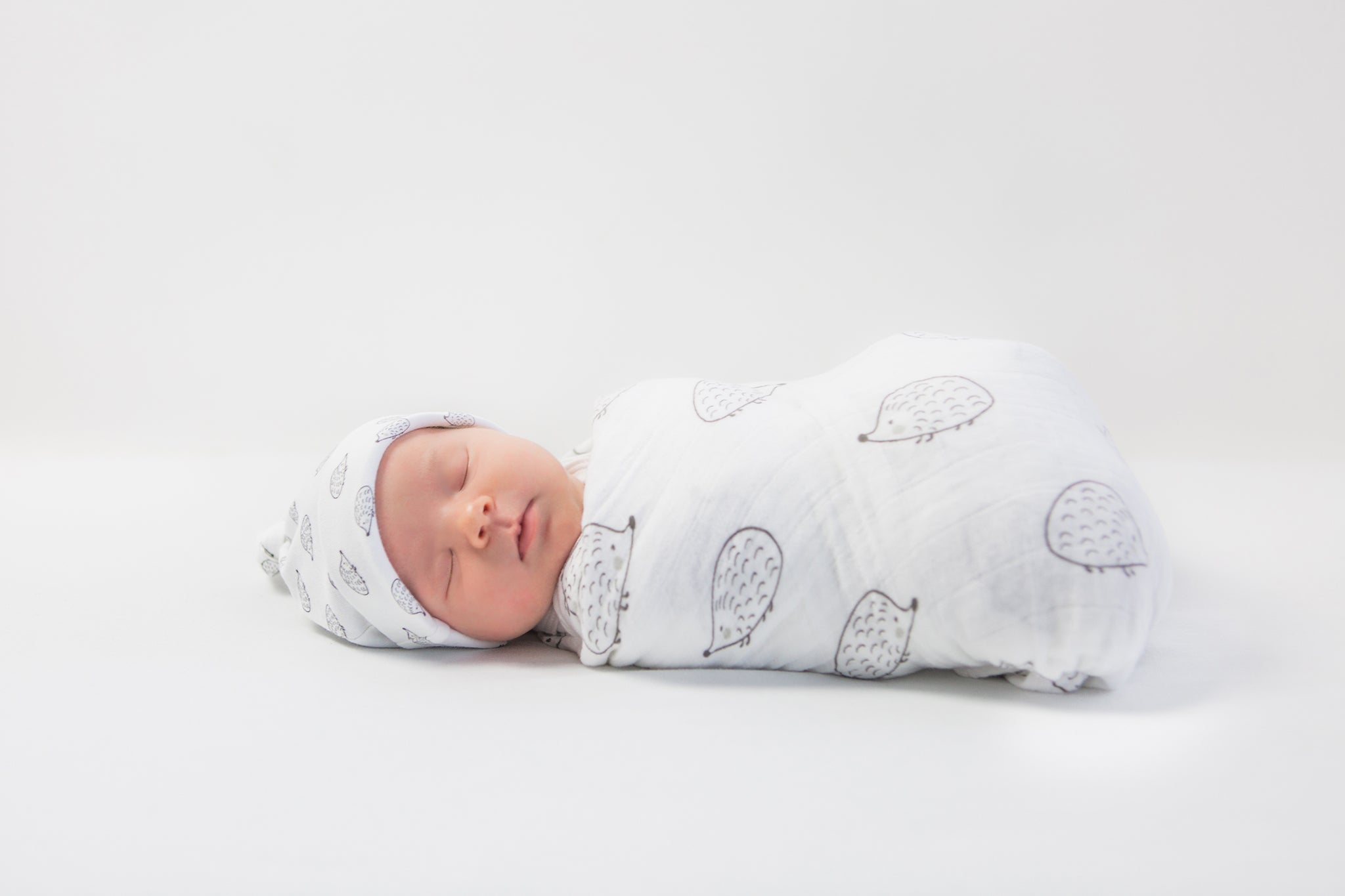Easy as 123 Swaddle®
 |
Step One
|
 |
Step Two
|
 |
Step Three
|
 |
Swaddle!
|
| Always place baby on their back, face up, for sleep. |

Experts including Dr. Harvey Karp, Dr. Tom Keens, Dr. Laura Jana, Dr. Bradley Thach, Dr. Sears…. recommend swaddling for sleep time. In 2002, Dr. Bradley Thach led a study that proved that swaddled back sleeping babies sleep better than unswaddled babies.
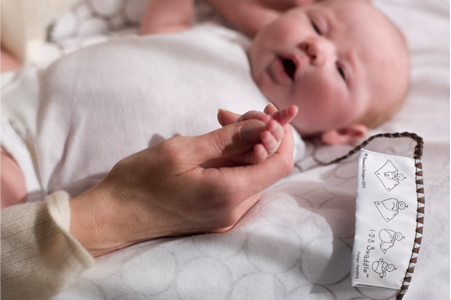

SwaddleDesigns blankets are the only swaddling blankets with instructions sewn to the edge of the blanket. Moms, dads, grandparents and caregivers appreciate the instructions at their fingertips when they are learning how to swaddle.
Supine swaddling helps to reduce risk of SIDS because swaddling helps babies sleep better on their back, therefore parents are less likely to use unsafe tummy position for sleep.
Doctors, nurses, childbirth educators, doulas, parents, and medical experts recommend SwaddleDesigns blankets because they are large, square, lightweight and breathable. Cotton is a natural and breathable fabric which reduces the risk of overheating.
Natural Position
Experts recommend swaddling baby in a natural position with elbows, knees and hips flexed for proper joint development. When swaddling a newborn, many experts recommend swaddling with baby's hands within reach of mouth so baby can suck on his or her fingers to self-console.
You may also choose to wrap baby with one or both hands down inside the swaddle with baby's elbows in a flexed position. After breastfeeding is established, you may choose to offer baby a pacifier.
Wrap Snugly
A loose swaddle is ineffective, so wrap baby snugly, but not so tightly as to impede baby's breathing. You should be able to slide your hand between the blanket and your baby's chest.
Custom Fit
SwaddleDesigns large square blankets allow for a custom fit swaddle for your baby. Our swaddling blankets are designed with good stretch when they are in the diamond position for swaddling. Every baby is unique. Ask your baby's pediatrician about swaddling your baby.
Always Place Baby on Back to Sleep
Always place baby on his or her back for sleep. The side and tummy positions are unsafe.
The back sleeping position reduces risk of SIDS. Baby should sleep on a firm sleep surface, in a bassinet, cradle or crib near the mother's bed, without any soft toys, pillows or loose bedding.
Baby's Sleep Environment
Room Temperature
Medical experts recommend a sleep environment of 65-70°F (18-21°C)
It is an important responsibility of the caregiver to dress baby appropriately for sleep based on the temperature of their environment. Parents should not overdress or underdress baby for sleep. As a general guide, the American Academy of Pediatrics recommends dressing baby in no more than one layer more than an adult would use to be comfortable in the same environment.
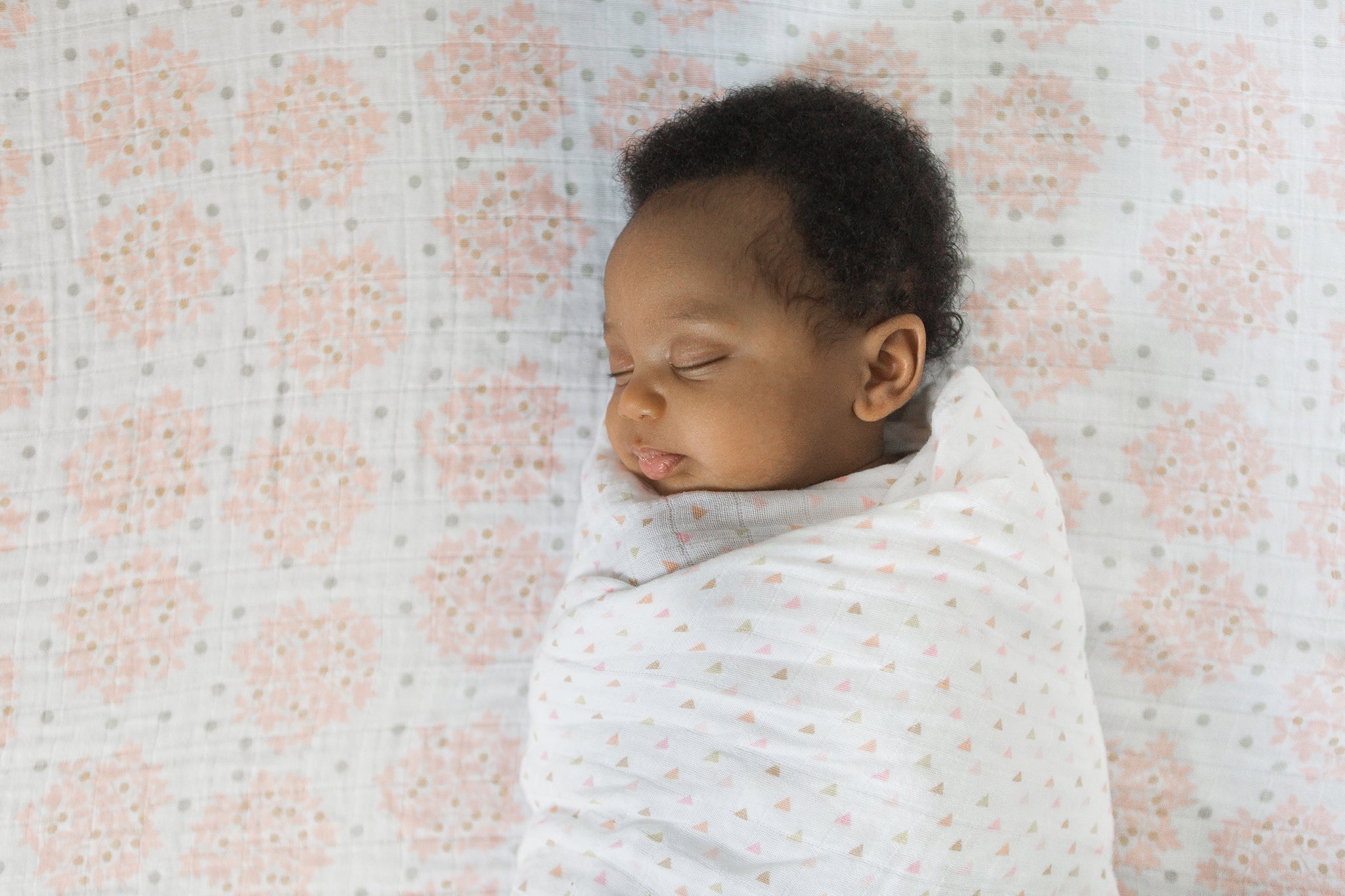
Babies are not good at regulating their own temperatures. No blanket can naturally regulate baby's temperature for them, so parents need to touch and feel their baby to ensure baby is not too warm or too cold.
Smoke-Free Environment
Always keep baby's environment smoke-free by not smoking when pregnant, near your baby, or in an area where your baby spends time or sleeps.
Ventilation
Be sure air can circulate freely around baby's face. A fan in baby's room can increase ventilation, but should not be blowing air directly on baby.
Allow Baby to Suck on Fingers or a Pacifier
Infant researchers state it's in baby's best interest to have baby's hands within reach of mouth, so baby may self-soothe by sucking on his or her fingers. Sucking is the most organizing behavior of the newborn – it helps baby with sleep/wake control. Sucking is an early form of communication - by vigorously sucking, a baby communicates that he or she is hungry.
As your baby grows stronger or if you have a very active baby, you may tuck one or both hands down into the swaddle with their elbows flexed and offer baby a pacifier. Babies who suck on pacifiers have reduced incidence of SIDS.
As you learn more about your baby, you will find which hand position works best for your baby.
When to Stop Swaddling
The AAP recommends to stop swaddling around 2 months of age and to then transition baby into a wearable blanket or sleeping sack. Babies that are able to roll over should not be swaddled for sleep. Babies that can roll over may be placed in a Transitional Swaddle Sack or a Sleeping Sack such as our zzZipMe Sack.
Swaddle Blankets and Fabric Choice
All SwaddleDesigns Swaddle Blankets feature our exclusive 123 Swaddle illustrated instructions sewn to the edge of the blanket.
Ultimate Swaddle Blanket

Cotton Flannel is the #1 Choice in US Hospitals for Swaddling
Hospitals trust and use cotton flannel blankets to wrap babies soon after birth to keep them warm and comfortable. Your baby will quickly outgrow the hospital-size blanket and you will need a larger receiving blanket to swaddle your baby as he or she grows.
Our Ultimate Swaddle Blanket is made from super soft premium preshrunk cotton flannel. It's square, lightweight and breathable. 42” x 42”. Made in USA.
Muslin Swaddle Blanket
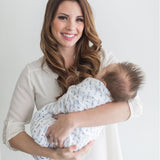 Wrap your baby in pure softness. Our boutique quality 100% cotton muslin with cheerful designs gets softer with every wash. The open weave increases breathability and reduces the risk of overheating. The generous size, square shape and helpful labels will make it easy to swaddle. 46” x 46”. Imported.
Wrap your baby in pure softness. Our boutique quality 100% cotton muslin with cheerful designs gets softer with every wash. The open weave increases breathability and reduces the risk of overheating. The generous size, square shape and helpful labels will make it easy to swaddle. 46” x 46”. Imported.
Marquisette Swaddle Blanket
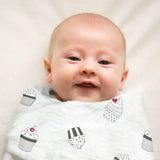
SwaddleDesigns Marquisette Swaddling Blanket is an ultra soft, very lightweight open weave blanket made from 100% cotton. Appropriate for warmer environments, cotton marquisette is crafted from cotton that is superior in length, strength, and smoothness to create a very soft and premium quality blanket that will get softer after every wash. Our exclusive 123 Swaddle instructional tag is sewn to the edge of each blanket. 46” x 46”. Imported.
Benefits of Swaddling
Medical studies have shown there are many benefits to swaddling.
Supine Swaddling Decreases the Risk of SIDS
-
Swaddled back sleeping infants have a lower incidence of SIDS than unswaddled back sleeping infants
-
When babies sleeps better on their back, parents are less likely to use the unsafe tummy position for sleep
-
Swaddling helps sleeping infants remain on their backs
Swaddled Babies Sleep Better®
-
Swaddling decreases occurrence of the startle reflex which frequently wakes unswaddled babies
-
Infants sleep with fewer awakenings when swaddled and have twice as much REM sleep
-
REM sleep is believed to be important for brain development
-
When babies sleep better and longer, parents get more sleep, too
Reduces Colic and Fussiness
-
Snug swaddling soothes babies by reminding baby of the snugness of the womb
-
Swaddling helps prevent over-stimulation
-
Babies are inefficient at regulating their temperature. Swaddling helps keep baby warm
Helpful When Breastfeeding
-
Tucking baby's hands into the swaddle will keep baby's hands from impairing latch-on
-
Baby's extra movements are nicely contained when swaddled which can help baby focus and latch on. Once baby has learned how to latch on and is nursing, remove the swaddle so baby and mom can be skin to skin and tummy to tummy.
-
Use the blanket to drape over mom and baby for warmth. Skin to skin is best when learning how to breastfeed.
